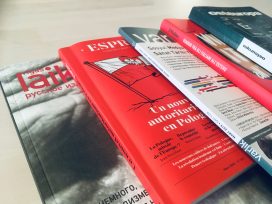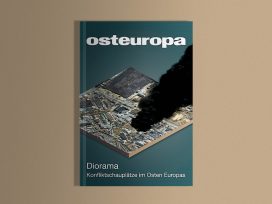Blind thirst for community
- Eurozine Review
4/2019
‘Osteuropa’ compares degrees of toxicity in Russia and Turkey; ‘Varlık’ debates post-Kemalism; ‘Czas Kultury’ explores Poland’s male retrotopias: ‘Esprit’ learns from the black sheep of Europe; ‘Il Mulino’ catches up with Italy’s diaspora; and ‘Rigas Laiks’ talks mad philosophers, linguaphiles and stray dogs.
Osteuropa (Germany) 10-12/2018
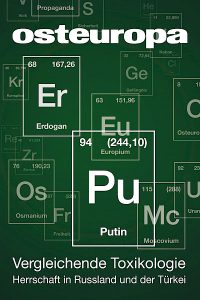
Today’s apparent convergence between the political regimes in Turkey and Russia prompts Osteuropa to compare the two in terms of historical evolution, continuity with authoritarian predecessors, foreign policy, economy and state, media and academic freedoms, and human rights.
Revolutions: Historian Stefan Plaggenborg seeks parallels and distinctions between Kemalism and Bolshevism. Despite their simultaneity, the two revolutionary movements were miles apart ideologically. While the Bolsheviks followed no historical example, the Kemalists drew on traditions of European modernity. Doubting, not unreasonably, that Kemalism was interested in the ‘democratic liberation of the masses’, the Bolsheviks scathingly referred to the revolution in Turkey as a transition ‘from a monarchist satrapy to a bourgeois democracy in the East’. But Kemalism’s retroactive character should not imply it was any less radical: ‘The abolition of the Sultanate and the Kalifate and the reform of the written language represented a deep incursion into the life of the populace’.
In terms of violence perpetrated by the two regimes, differences were also huge. ‘It would be a grave mistake to compare the millions of victims of Bolshevik persecution between 1917 and 1953 with events in the Turkish republic,’ argues Plaggenborg. This is not to deny the Kemalist repressions during the revolutionary phase, nor the brutal crushing of the Kurdish uprising in 1925. However neither places the Kemalist regime on a level with Communism in the Soviet Union.
The defeat of the Kemalist CHP in free elections in 1950 – a ‘plebiscite against the Kemalists’ (Bernard Lewis) – is an indication of the fundamental incompatibility of the two regimes. However, it was not the case that democracy was then restored to Turkey. The civil war of the 1970s showed that Kemalism had failed to provide a democratic basis that would prevent the emergence of anti-democratic forces. According to Plaggenborg: ‘With the repressions beginning in Summer 2016, the Erdoğan regime did not attack a sturdy democracy but steered a traditionally labile democracy in an anti-democratic direction.’
Foreign policy: Now that EU membership is off the table for Turkey, and Russian Nato membership is equally improbable, ‘crocodile tears are flowing’ in the EU, writes political scientist Andreas Heinemann-Grüder. ‘If there is any lever with which to contribute to transformation in eastern Europe, then it is the prospect of Euro-Atlantic integration.’ European politicians ‘should first of all rid themselves of the illusion that they can influence the political regimes in Turkey or Russia. It is primarily a matter of damage limitation and of establishing where one can work with both regimes and where one can’t.’
More articles from Osteuropa in Eurozine; Osteuropa’s website
Varlik (Turkey) 2/2019
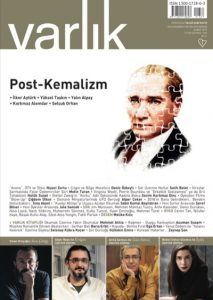
Varlık attempts a historiography of the last fifty years in Turkey. What were the intellectual forces that helped Erdoğan’s AKP to power and legitimated the dismantling of so much of the architecture established by Mustafa Kemal Atatürk? What is post-Kemalism? And what comes next?
Achievements: Political scientist İlker Aytürk acknowledges that Kemalism had many critics, often at odds with one another, even during Atatürk’s lifetime. But it was only after the 1980 military coup that ‘criticisms that had so far followed separate channels without contacting one another, for the first time united and changed both qualitatively and quantitatively’. This, he argues, is post-Kemalism: a framework developed and expressed by the liberal left that formed the common ground to unite liberals, conservatives, Islamists and the Kurdish movement. This framework had two common elements: the diagnosis that Turkey’s democracy could not develop because Atatürk’s republic had been badly formed, and the remedy that lay in allowing excluded Kurds and Islamists into power ‘to lay the foundation for a new, egalitarian, libertarian Republic’. Aytürk identifies the Gezi Park Protests in 2013 as the point at which ‘post-Kemalist elements separated, the coalition disbanded, and partners of almost 30 years began open conflict’.
Evasions: Yüksel Taşkin attacks post-Kemalism for its failure to examine the true sources of authoritarianism in Turkey. ‘By attributing authoritarianism solely to Kemalism … the liberal readings of post-Kemalism opened the way for huge errors,’ he writes. And by stressing the ways in which Kemalism’s westernizing reforms created cultural alienation in Turkey, it ‘played a significant role in various movements on the Turkish right positioning themselves as “the natural heirs to government”.’ Yalın Alpay argues that the dissolution of the consensus around post-Kemalism has forced Islamists to produce their own narratives. No longer able to borrow from liberal thought, the AKP has ‘largely shifted into populist texts’ that are ‘within the post-truth framework, narratives that speak to the emotions of the masses and do not depend on realities and evidence’.
Literature: Selçuk Orhan traces responses to Kemalism in Turkish literature, from children of the Republic such as Kemal Tahir, Ahmet Tanpınar and Sabahattin Ali to today’s writers such as Orhan Pamuk and the Marxist-Islamist Ihsan Eliaçık.
More articles from Varlık in Eurozine; Varlık’s website
Czas Kultury (Poland) 1/2019
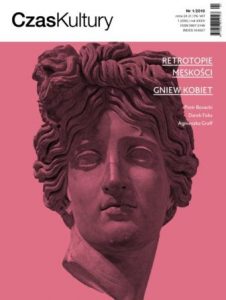
Broken connections, commodified relationships and social polarization have brought violent resentment into politics and ‘fear into life itself’, observes Błażej Szymankiewicz in Czas Kultury. Incorporating western sociological discourse on masculinities and the erosion of social ties, the issue includes an extended package on the economic, political and cultural manipulation of the male image, quirkily interspersed with poetry and surreal photographic collage. In an atmosphere of isolation, humiliation, loss and aggrieved entitlement among men, a ‘blind thirst for community may strengthen the fascist movement or connections with alt-right ideology’.
Misogyny: An online narrative is being built in which feminism, political correctness, Islam and multiculturalism together form the matrix in which male oppression is growing, as Agnieszka Graff shows. Alt-right blogs, forums and websites associated with the ‘manosphere’ offer advice on how to manage women; misogyny is politicized; racism thrives; ‘jokes’ may incite to rape or violence; and nurturing masculinity is presented as an existential challenge.
Hegemonic masculinity: TVN Turbo – an automotive channel aimed at male viewers – is now the most popular lifestyle TV station in Poland. In terms of gender presentation, it highlights only dominant, hegemonic masculinity and patriarchy, writes Krzysztof Arcimowicz. ‘Real men’ are associated with muscle and fast cars. Women are scantily dressed, indecisive and intellectually inferior. Sexual minorities or different masculinities are introduced only to be mocked.
Catholic warriors: An image of medieval masculinity is being revived through the promotion of the figure of the ‘Soldier of Christ’ in the Catholic Church, according to Andrzej Draguła. Members of Catholic men’s groups such as the ‘Knights of Mary’ or the ‘Alliance of Fighters’ dub themselves ‘warriors’. Their iconography features rosaries alongside swords or machine guns. Declared missions include the development of physical, psychological, and spiritual strength for service to the family, the brotherhood and the Church. ‘Among men who retain religious faith, many have been deprived of the possibility of fulfilling themselves as warriors. They feel spiritually castrated.’
Fiction: In recent Polish fiction, writes Paweł Tomczak, ‘alternative histories’ reflect a masculinity unconstrained by traditional values like honour, loyalty or chivalry. Instead, heroes are defined by pragmatism, drive and success. By way of example, Tomczak cites The Ribbentrop-Beck Pact by Piotr Zychowicz (2012), a fantasy about a Second World War in which Poland sides with Nazi Germany against the USSR, then shakes off the alliance and establishes itself as a great power.
More articles from Czas Kultury in Eurozine; Czas Kultury’s website
Esprit (France) 3/2019
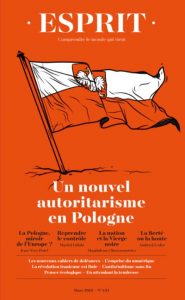
The mix of social policy, authoritarianism and nationalism that characterizes Poland’s ruling party Law and Justice (PiS) may have made the country the black sheep of Europe, but the Polish case is far from isolated, according to Esprit’s March issue on ‘A new authoritarianism in Poland’ (edited by Jean-Yves Potel). The fact is that many European parties are trying to take advantage of a general dissatisfaction with the neoliberalism of the past thirty years, so that the Polish case is full of lessons for Europe as a whole.
Taking back control: The success of PiS is due neither to its demagoguery, nor to class anger, but to citizens’ feeling of regaining political control, particularly over the limits of national community. In an interview, Maciej Gdula of the university of Warsaw presents the results of a survey carried out in a middle-size Polish town. It reveals three pillars of popular support for PiS: moralistic rhetoric against elite corruption; the refusal of refugees; and the feeling of empowerment. In the absence of a strong ideology, the new Polish authoritarianism is based on this feeling of empowerment.
Feminism: The Polish government’s attempt to abolish abortion rights in 2016 was one battle in a historical civil war, argue Agata Araszkiewicz and Agata Czarnacka. ‘The curse of Poland’s complicated, martyrological history is the “then you” mechanism underlying its resistance movements, which allowed women to be involved in the struggle without their empowerment: first independence, then you; first a strong state, then you; first victory, then you; first socialism, then you; and finally: first capitalism… Equality has always been postponed this way. Contemporary Poland is a country in which the struggle for modernity takes place at the expense of women.’
Identity politics: Collective responsibility for past crimes has become the touchstone of maturity in the second half of the century. Yet in Poland, the rejection of human rights is often associated with pride, argues Andrzej Leder. Since the Smolensk plane crash in 2010, a competition between narratives has poisoned debates, undermining truth and encouraging conspiracy theories. The loss of a common future condemns Poland to a conflict of identity politics, symptomatic of which are the debate on refugees and the memory of the Holocaust.
More articles from Esprit in Eurozine; Esprit’s website
Il Mulino (Italy) 6/2018
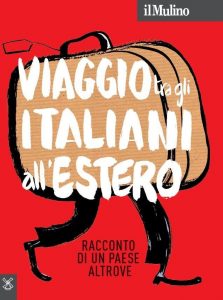
Il Mulino publishes an issue featuring the diverse stories of Italians who have opted for life abroad, with tales of ‘success and satisfaction, but also hardship and failure’. Despite the lack of uniformity and unreliability of migration data, there has been an unequivocal upsurge in emigration from Italy over the past decade. Concerns over the ‘brain drain’ feature heavily, particularly with regard to the younger generation, with emigrants with university degrees on the rise. To counter the negative effects of emigration, write the editors, a vision is needed to ‘restore faith in the future; a future which today, is being sought elsewhere’.
Experience: While each diaspora narrative is unique, there are common echoes. In Berlin, Giacomo Della Maria describes displacement into a new language as ‘a loud and absolute silence’; leaving for foreign soil is an experience that involves ‘searching, waiting, listening, and above all, learning to respect’. The need for patience is reflected in Corinne Barchetta’s narrative, where in Paris, an initial sense of foreignness and isolation eventually evolves into the achievement of professional and social integration. Della Maria cites quality of life in Germany as a significant deterrent to returning to Italy, while Barchetta’s return from France was motivated by her dissatisfaction of being a removed spectator of her country. At the social level, she missed ‘the effortless chat and the irony of Italians, the expressiveness of their faces, the ease in communicating emotions through a shared look or gesture’.
Online diaspora: Today, narratives of the Italian experience abroad are found in abundance on social networks, blogs and discussion groups, ‘free from mediation or selection by the media’. Social media has facilitated all forms of emigration, whether motivated by work, studies, love or retirement. The web has in fact ‘substituted transnational migration networks, or rather, it has become the natural way forward’ for the growing number of Italians choosing the increasingly well-trodden paths of integration and assimilation abroad. Online community interaction creates a ‘delicate web of connections’ that becomes a vital form of social capital, assisting with access to employment and housing and the navigation of foreign bureaucracy.
More articles from Il Mulino in Eurozine; Il Mulino’s website
Rigas Laiks (Latvia) Winter 2018/2019
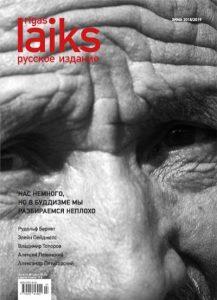
The quarterly Russian language edition of the Latvian journal Rigas Laiks boasts an impressive selection of interviews and articles featuring experts in philosophy, religion, language and the arts.
Into the abyss: Arnis Rītups, the magazine’s editor, talks to Rudolf Bernet about how philosophy has changed his perspective on life. The Swiss philosopher muses on why questions are more important than answers and believes that ‘philosophy must free man from his opinions’. Bernet concedes that philosophers are ‘on the verge of madness all the time’ and reveals his fears, not about dying, but about the suffering associated with old age. Although he knows many have lofty ambitions of reading the complete works of Aristotle, Kant and Hegel, for beginners to philosophy, he says Heidegger is a much more logical starting point.
A great linguaphile: Editor-in-chief Uldis Tīrons looks back at an interview with Russia’s Vladimir Nikolayevich Toporov in Riga in 2003, which took place two years before the renowned philologist’s death in 2005. The first winner of the Solzhenitsyn Prize and a gifted linguist, Toporov discussed his life and his strong interest and allegiance to the Baltic region, which famously caused him to turn down the USSR State Prize in 1990 in protest at the Soviet Union’s repressive policies in Lithuania. He lamented the demise of the Russian language and urged Latvians to preserve their native tongue: ‘As long as the Latvian language exists, there is Latvian culture,’ he says, whereas ‘the worst thing that happened in Russia was that the language degenerated’.
Stray dogs: Ethnologist and wolf expert Andrei Poyarkov talks about the phenomenon of stray dogs that emerged in Russia at the end of the last century. By 1996 there were as many as 22,000 strays in Moscow alone. Poyarkov’s studies have shown the city’s attempts – some more barbaric than others – to limit its number of unwanted four-legged friends, including efforts to clean up the city in the run-up to the 1980 Summer Olympics. He says the strays have adapted to their surroundings to outsmart humans and to blend in, often crossing roads ‘mainly at traffic lights, if they are intelligent’. While some compare the dogs to vermin, these ‘small neighbours’ have learnt to evade the cruelest control measures imposed by the authorities, and win the affection of many Muscovites in the process.
More articles from Rigas Laiks in Eurozine; Rigas Laiks’s website
This is our 4/2019 Eurozine review. Click here to subscribe to our reviews, and you also can subscribe to our newsletter and get the bi-weekly updates about latest publications and news on partner journals.
Published 13 March 2019
Original in English
First published by Eurozine
© Eurozine
PDF/PRINTNewsletter
Subscribe to know what’s worth thinking about.
